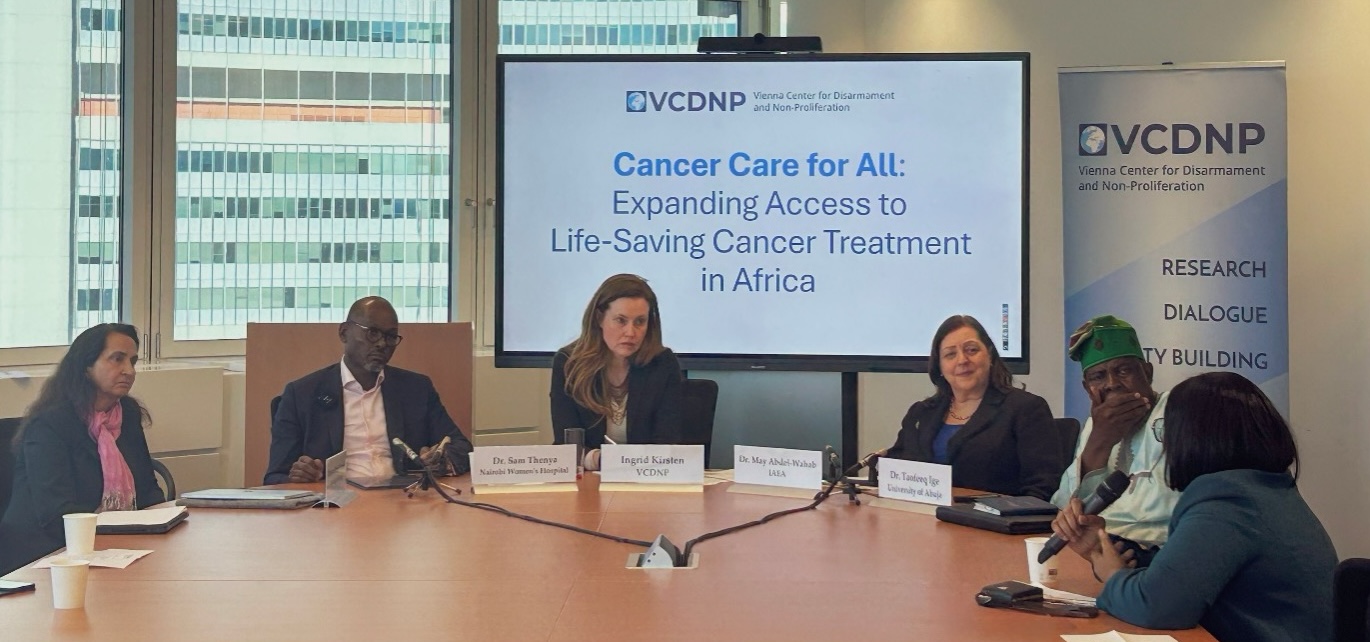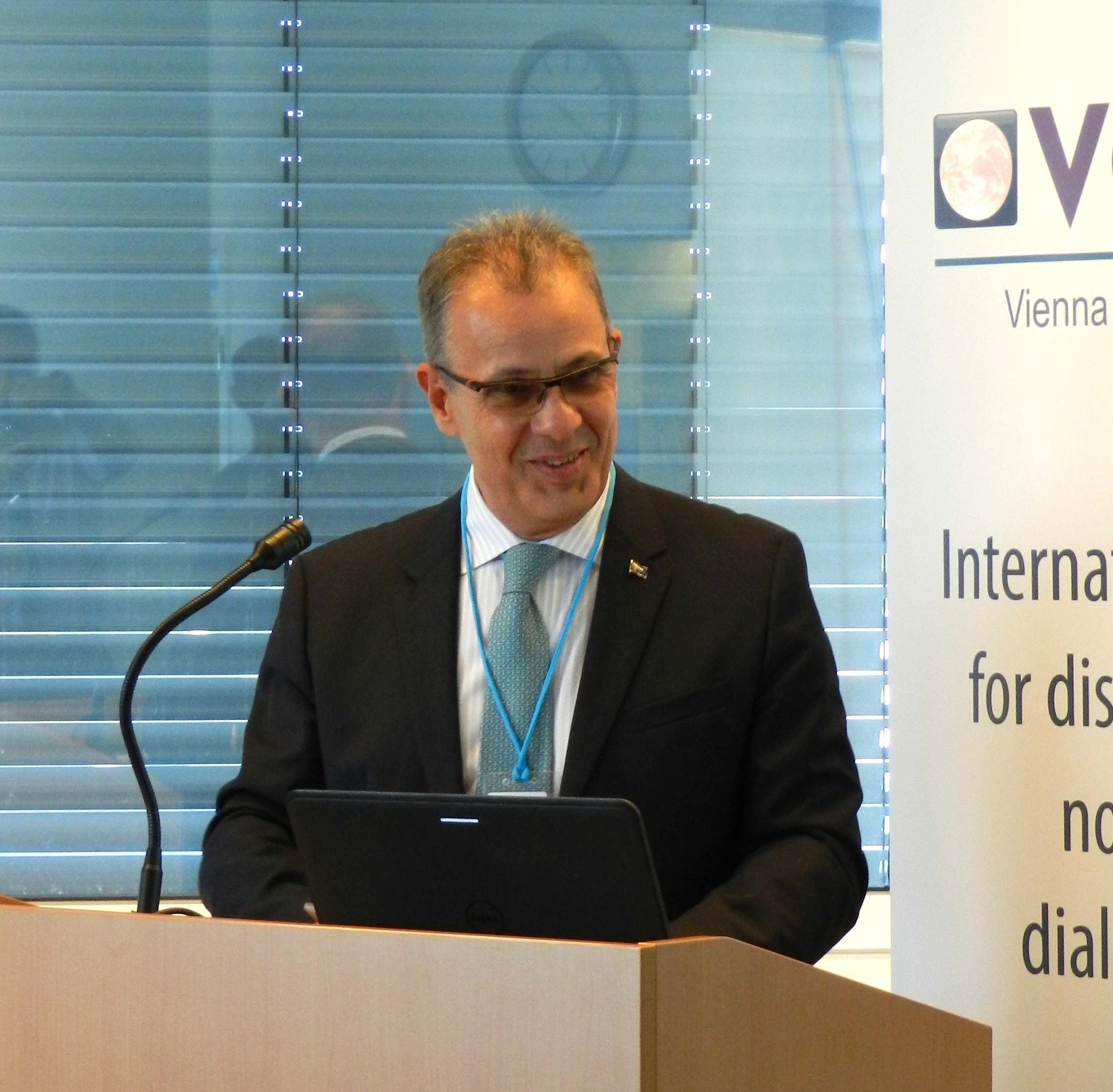
On 18 March 2025, the Vienna Center for Disarmament and Non-Proliferation (VCDNP) organised a panel discussion on "Cancer Care for All: Expanding Access to Life-Saving Cancer Treatment in Africa". The event, moderated by VCDNP Senior Fellow Ingrid Kirsten, featured leading experts from the International Atomic Energy Agency (IAEA), academia, and the private healthcare industry who shared their perspectives on the growing cancer crisis in Africa. Highlighting both challenges and progress, the panel examined ways to expand access to cancer diagnosis using nuclear medicine imaging and treatment through radiotherapy applications.
The speakers were:
Cancer is a global health crisis, but its impact is particularly severe in Africa, where limited access to early diagnosis and treatment is driving high mortality rates. Women bear a disproportionate burden, particularly due to breast and cervical cancer.
The panellists noted that Sub-Saharan Africa faces a critical shortage of radiotherapy machines and trained specialists. The IAEA provides extensive support to its Member States in establishing cancer treatment facilities and advocates for the benefits of radiation therapy in cancer treatment. However, investment from governments, development partners, and the private sector in this life-saving technology remains insufficient, despite compelling evidence of cancer’s devastating impact on families and the economy, as well as data demonstrating the cost benefit of cancer treatment. Experts highlighted that investing $230 billion to scale up quality cancer imaging and treatment globally could generate an estimated $2.6 trillion in net benefits.
The panel identified challenges to expanding access to cancer care, including:

Dr. May Abdel-Wahab outlined the IAEA’s extensive support to its Member States and the professional community in establishing and strengthening diagnostic imaging and nuclear medicine practices, within a framework of safety and quality. She emphasised the need for sustainable financing through partnerships with development banks, industry, and development partners to support equipment procurement, maintenance, skills development, and patient access. She advocated for shorter medical training programmes to accelerate specialist availability and emphasised the importance of research and data collection for effective policy and resource allocation.
Dr. Wahab highlighted the Rays of Hope initiative, which enhances the scope and visibility of the IAEA’s efforts to address the lack of access to radiotherapy. The initiative also raises the profile of radiation treatment as a high-impact, cost-effective, and affordable response to the growing cancer burden.
Prof. Manjit Dosanjh underscored the role of innovative technologies and collaboration in improving treatment efficiency and reducing costs. Project STELLA aims to develop a transformational radiation therapy system that is more affordable, reliable, and suited to the challenges faced in low- and middle-income countries (LMICs). The initiative also promotes AI-driven solutions to optimise cancer care delivery and reduce reliance on large specialist teams.
Dr. Taofeeq Ige shared insights from Nigeria, where public-private partnerships have shown promise in improving access to cancer care. He advocated for the rapid advancement of cancer care through systematic, data-driven approaches and AI integration rather than following traditional developmental pathways, whilst maintaining scientific rigour. He emphasised that, despite the urgency to improve cancer care in Africa, implementation must be careful, systematic, and scientifically sound to avoid unintentional harm to patients.
Dr. Sam Thenya advocated for public-private partnerships to expand healthcare infrastructure. He also proposed innovative financing mechanisms, such as healthcare bonds, to fund cancer treatment and equipment sustainably. To mitigate the shortage of specialists, he suggested leveraging technology and telemedicine. Dr. Thenya underscored the need for better governance, accountability, and policy reforms to create a more sustainable healthcare system that encourages private sector participation while ensuring equitable access to quality cancer care.
The panel concluded that addressing cancer care in Africa requires a multifaceted approach, involving collaboration between governments, international financial institutions, development partners, international organisations, private philanthropies, and the private sector.
Evidence-based advocacy highlighting both the substantial economic returns on investment and the significant market opportunities across Africa's growing healthcare sector is essential to mobilise resources and political will. Through the adaptation of advanced technologies to local conditions, the enhancement of workforce training, increased public-private partnerships, and the reinforcement of political commitment, access to life-saving cancer treatments can be expanded and the cancer burden across the continent alleviated.



